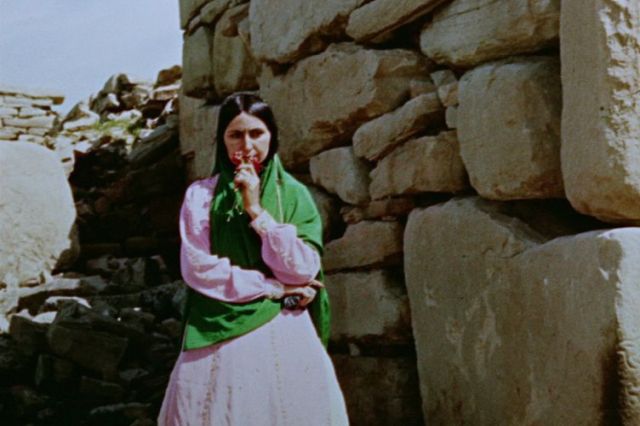Bologna for Iran: meetings, screenings and debates on freedom, rights and culture

Image from "The Crown Jewels of Iran" (Ganjine-haye gohar, Iran/1965) by Ebrahim Golestan
The Bologna Town Council, the University of Bologna and the Cineteca di Bologna have joined forces in a show of support and solidarity towards the Iranian people intended to create engagement and raise awareness in the city and civil society in general. From 20 to 26 February, the Bologna for Iran initiative, organised in collaboration with JCI - Joint Cultural Initiative, will fill the spaces of the city’s Cineteca and DAMSLab with a rich film festival and with meetings and debates on freedom, rights and the Iranian culture.
The initiative will kick off on Monday, 20 February at 5 p.m. with the University of Bologna’s opening ceremony for the 2022/2023 academic year, the 935th since the University was founded, in the Santa Lucia Great Hall, where the guest of honour, Iranian artist and intellectual Marjane Satrapi, will hold a lectio magistralis entitled "The freedom of mind".
After the ceremony, at 8 p.m., Marjane Satrapi will be at the Cinema Lumière to present the screening of her film “Persepolis”, alongside Gian Luca Farinelli, Director of the Cineteca di Bologna.
On 23 February, at 8 p.m., Mohsen Makhmalbaf’s "Kandahar” will be screened, at the presence of the film director himself. Earlier that day, at 5 p.m., a debate entitled "A non-conformist director between Iran and Afghanistan" will be held between Makhmalbaf, Rita Monticelli, the Mayor's Delegate for Human Rights and Inter-Religious and Inter-Cultural Dialogue, and the scholars-cum-journalists Giuliano Battiston, Francesco Strazzari and Huma Saee. The event will be moderated by Italo Spinelli of JCI - Joint Cultural Initiative and Artistic Director of the Asiatica Film Festival.
Two meetings specifically dedicated to the condition of women in Iran will be held, the first at 4 p.m. on 24 February, with journalists Farian Sabahi and Marina Forti together with Massimiliano Trentin, a lecturer at the University of Bologna specialising in International Relations, and the second at 4 p.m. on 25 February, centring on the subject of writing, with the authors Ginevra Bompiani and Lidia Ravera, together with Bianca Maria Filippini (PhD in Iranian Studies from the "L'Orientale" University of Naples) and Leila Karami (lecturer at the University La Sapienza in Rome and Ca' Foscari University in Venice, where she teaches contemporary Persian literature).
Another event, held from 24 to 26 February, is the Cineteca di Bologna film marathon. At the heart of a rebellious nation lies a rebellious art. For the Iranians, ever since the 1950s, this art has been the cinema. Films have become bloodless battlegrounds, a popular medium capable of dissecting society and its evils with razor-sharp precision. The works chosen for this festival, curated by Ehsan Khoshbakht, are skilful cinematic rebellions against injustice, indifference and oppression that have lost neither their bite nor their urgency.
In the words of Rita Monticelli, the Mayor's Delegate for Human Rights and Inter-Religious and Inter-Cultural Dialogue: "With Bologna for Iran, we wish to come together and show our support to the families and friends of the too many victims killed for expressing their thoughts, for removing their veils, for helping injured activists, for a non-standard orientation, for a lock of hair out of place. We also wish to express our solidarity towards the Iranian community in Bologna and those whose rights have been violated. Far from disrespecting cultural, religious and ethnic diversity, we should be strengthening the inter-cultural dialogue and a mutual understanding in the pursuit of equal rights".
"The Alma Mater is keen to participate in these days of engagement and culture," adds Federico Condello, the University of Bologna’s delegate for students, "opening with the inauguration of the University's academic year, with the participation of Marjane Satrapi. We made this choice because Iran concerns us all. The rights for which so many young Iranians are fighting, suffering and dying are the rights of us all; these are rights that the University is committed to defending in all circumstances. We feel this even more strongly given the presence at UniBo of one of the largest Iranian student communities, with over 260 new Iranian first year students, mostly women, having been welcomed into the Alma Mater this year alone. The killing of Mehdi Zare Ashkzari was extremely distressing for this community of over 1,000 students and for the entire university. We intend to stand by their side; by the side of all those who cry out 'women, life, freedom'".
"Repression in Iran began well before Mahsa Amini's death," explains Italo Spinelli of JCI, Joint Cultural Initiative and Director of the Asiatica Film Festival. "It strongly affected female documentary filmmakers, film directors and actresses – indeed, cinema as a whole. Cinema is a place for debate, and in a country where there are no alternative parties to the regime, it was hit first. It is impossible to turn the other way. What is happening in Iran is not right and it is not human".
"Cinema has always been a place of freedom for the Iranian people," concludes the Director of the Cinteca di Bologna, Gian Luca Farinelli. "What the Bologna Film Library has been doing in recent years is to bring back to the fore the cinema of the Shah, before the Islamic revolution, whose films have often been censored and essentially forgotten. This was partly made possible by the restoration work carried out in collaboration with Martin Scorsese's The Film Foundation and World Cinema Project."






